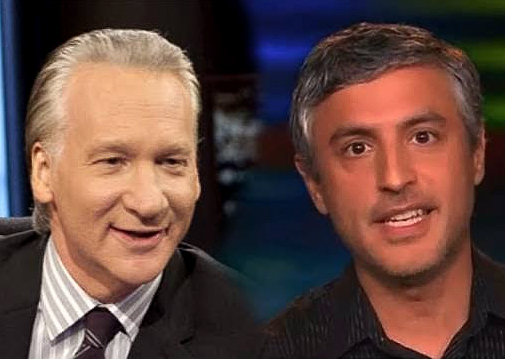I have been following, with some glee, the verbal spankings that Bill Maher and other “New Atheists” have been getting from the likes of Ben Affleck and Reza Aslan. For years I have been not so much annoyed as dismayed by the utter naïveté of spokespersons like Maher or Sam Harris, who earnestly argue that if “religion”–by which they of course mean “belief” or “blind faith”–would just go away, violence would also magically go away and world harmony would take its place.
These folks have so uncritically embraced modernist body-mind dualism that they blame all of the world’s problems on bad ideas (of which Islam is apparently the “motherlode”). As an ethicist, I am very interested in good and bad ideas, which lead to flourishing or suffering. But for all their love of “facts,” the New Atheists completely ignore history–the messy web of concrete factors like power, land, genetics, weather, hormones, economics, chemistry, and even good old father issues that give rise to ideas.
As postmodern theorists have been telling us for decades, religious “beliefs” do not simply spring up sui generis or ex nihilo. On the contrary, they exist within bodies–messy blobs of blood and bone and nerve endings that need food, shelter, and social ties in order to thrive. A healthy dose of materialism would go a long way toward complicating their oversimplifications. (I can recommend Manuel Vasquez’s More Than Belief as a primer, or perhaps they could enroll in Brent Plate’s introduction to religion class.)
But I’m grateful to The Week’s Damon Linker for putting into words something that made me uncomfortable about parts of Reza Aslan’s rebuttal of these oversimplified claims. Aslan is absolutely right that there is no universal essence of Islam that some Muslims can possess; this means neither an atheist nor a jihadist nor the president gets to have the decisive word on what is “true” Islam and what isn’t. He’s also right that it is people who embody violence or peace in their religions, such that every religion has both violent and peaceful schools of thought.
But as Linker notes, Aslan’s defense also diminishes religion, gutting it and rendering it trivial. He says here, “People don’t derive their values from their religion—they bring their values to their religion.” Religions have no actual substance, in other words; they are mostly fancy packaging slapped onto something more real and powerful underneath. Religions are culture or nationalism or simple prejudice in drag. This, too, strikes me as an unwarranted oversimplification, as if “cultures” or “nations” or “prejudices” existed separately from the ideas or rituals that accompany and bolster them.
It is time to retire old-fashioned reductionism in any direction. Religion is neither only about ideas nor only about stuff. Ideas and stuff are inextricable; moreover they are constantly in flux. Let’s get rid of the “bad idea” that our beliefs exist separately from, or prior to, our bodies – our economies, our politics, or our family lives. Religious beliefs can be both a powerful cause of some behaviors and sometimes window dressing for darker motivations. How many of us are perfectly certain about who we are, or where our own motivations, ideas, and behaviors come from? Why should we expect entire religious traditions to answer questions we can’t even answer about ourselves?





